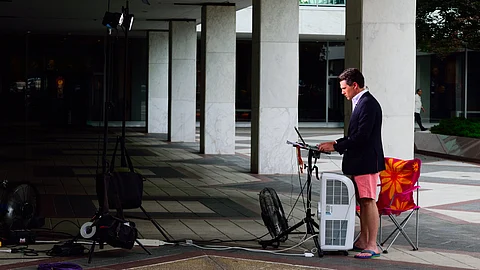

To be a journalist is to abide by a simple set of rules: be critical and curious, have integrity and ethical judgment, be resilient and adaptable, and, most importantly, understand the unimaginable power you wield.
"The pen is mightier than the sword." A phrase often repeated, sometimes ridiculed. After all, a sword can wound, even kill. But history has proven time and time again that words shape nations, topple empires, and define the reality we live in.
From the Declaration of Independence to Martin Luther’s 95 Theses, from the Pentagon Papers to the fall of Apartheid, writing has reshaped the course of humanity. And yet, as we stand in the digital age, we see the meaning of journalism changing beneath our feet.
It is not Gandhi or Martin Luther King shaping society today, it is the modern journalist. But rather than serving as a beacon of truth, many have forgotten their fundamental duty. Some do so blatantly, others through more subtle and dishonest means.
Does this mean all journalists are corrupt? Of course not. But the profession has become increasingly prone to fear-mongering, to telling people not just what happened, but what they should feel about it. The very essence of journalism, truthful and objective reporting, has been replaced with narrative-shaping.
The world has changed. News now travels at the speed of light, spreading across television, Telegram, TikTok, Facebook, X (formerly Twitter), and countless other platforms in real-time. A person in Berlin can learn about an event in Mumbai before someone living just a few streets away.
But as the speed of news increased, the quality of journalism collapsed.
Truth has been replaced with narrative. Depth has been sacrificed for engagement. Facts are filtered, twisted, or ignored entirely, depending on what drives clicks, ratings, and influence.
The show must go on.
And so it does.
The constant, deafening stream of information has left people drowning in news, yet starved of the truth. But who decides what is deemed "important"? News organizations, editors, corporate investors, political operatives, and, in some cases, even governments themselves.
You are not receiving raw, unfiltered reality. You are consuming pre-packaged, editorialized, and often manipulated narratives, crafted for maximum emotional impact and ideological alignment.
What is wrong with the media today? The answer is simple:
Journalists have abandoned their role as truth-seekers.
Media companies have forsaken their duty to inform.
Governments and special interests actively shape the narrative.
A true journalist does not tell you what to think. A true journalist presents facts, unbiased, unfiltered, and unafraid of where the truth leads.
Ask yourself: when was the last time you read a completely objective news report? One that gave equal weight to both sides, that left room for you to make up your own mind?
It used to be that way. It was the standard.
But bias now rules the newsroom.
Take, for example, media coverage of Donald Trump. This is not about whether you support or oppose him, it is about how coverage is framed. Every action, every word, every event is placed under a lens of negativity. If he were seen petting a kitten, a media outlet would find an animal rights group to claim it was done improperly.
But this is not just about Trump.
It is about the fundamental shift in journalism, where reporting has become weaponized. The same tactics are applied to leaders, nations, movements, and global crises.
The media no longer asks:
What happened?
Instead, it asks:
How do we make people feel about what happened?
A journalist's duty is not to shape public opinion, but to arm the public with facts so they can form their own. That means:
Critical, ethical, and fair reporting.
Unfiltered facts, not agenda-driven narratives.
The courage to challenge power, without serving another power in return.
In an era where misinformation and manipulation reign supreme, we do not need more activist-journalists or sensationalist reporters.
We need truth-seekers.
People who recognize that their words do not just inform, they construct the very reality we live in.
With that power comes responsibility.
It’s time for journalism to remember its purpose.